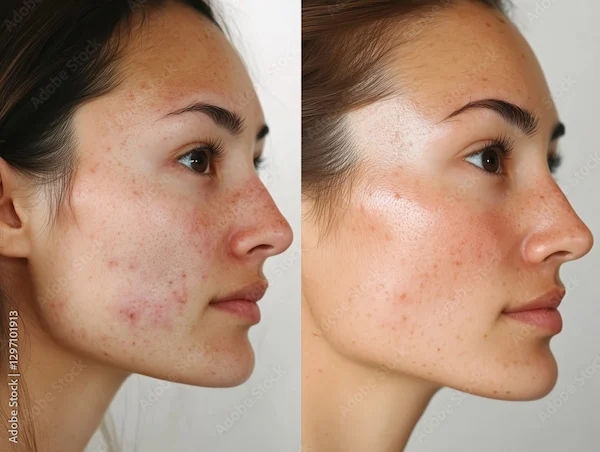How to Reduce Melanin in Face: Treatments, Natural Remedies & More
Learn the medical treatments and natural remedies to reduce melanin in the face. Discover the factors influencing melanin production in the face, preventive measures, safety considerations and more.

Written by
Last updated on 3rd Jul, 2025
Melanin is a skin pigment responsible for the colour of the skin, hair, and eyes. It is produced by special cells called melanocytes, which differ in mechanism in some people and produce more melanin. However, in some cases, melanin can accumulate and cause hyperpigmentation in some parts of the skin.
With the advancement of science and technology, it is now possible to treat melanin deposits. But there are certain risks. Read the following section to learn about medical treatments for melanin on the face, natural remedies, safety considerations and more.
Factors Influencing Melanin Production in Face
The production of melanin in the face is majorly impacted by three factors:
Genetic Factors: Melanocytes are controlled by the melanocortin 1 receptor (MC1R) gene. It plays a key role in determining the type and amount of melanin production. Any variation in the MC1R gene leads to fluctuations in facial melanin production.
Hormonal Changes: Fluctuations in hormones lead to increased melanin production in the face, which occurs mainly in three conditions: pregnancy, menstruation, and hormone replacement therapy.
Environmental Influences: The main environmental factor is exposure to ultraviolet (UV) radiation, which triggers the body to produce more melanin in the face. Apart from this, seasonal variations and pollution are also known to influence melanin production in the face.
Medical Treatments to Reduce Melanin in Face
Sometimes, the amount of melanin in the face increases abnormally, causing people to opt for medical treatment. They may include:
Topical Creams and Ointments: This is done with the help of five different creams:
Hydroquinone
Retinoids
Kojic acid
Tranexamic acid
Arbutin cream
These creams have different action mechanisms which work to reduce melanin in the face.
Laser Therapy: This treatment makes use of high-energy beams to break down melanin in the skin and reduce the hyperpigmentation of the face. There are two main types of laser treatment: ablative and non-ablative.
Chemical Peels: They effectively treat hyperpigmentation and are more suitable for dark-skinned people.
However, these treatments should only be undertaken after consulting with a dermatologist.
Natural Remedies for Reducing Melanin in Face
Some natural remedies are known to work effectively in reducing melanin production in the face. They are:
Herbal Solutions
When it comes to herbal solutions:
Ingredients like turmeric, green tea, cinnamon, and berries help regulate melanin production and reduce its accumulation.
Apart from these, other herbal solutions include apple cider vinegar, aloe vera gel, lemon juice and honey mask, papaya pulp, etc.
Ayurvedic dermatologists offer the best advice in such cases.
Dietary Changes
Considering diet, people should do the following:
Consuming a diet rich in antioxidants, vitamin C, and omega-3 fatty acids will help to reduce the amount of melanin in the face.
Items that have antioxidants include oatmeal, berries, carrots, ginger, and chia seeds.
A person should also consume foods rich in carotenoids and flavonoids to reduce melanin production in the face.
Home Skincare Products
Individuals should shift to skincare products containing the following:
Vitamin C
Kojic acid
Niacinamide
Azelaic acid
Liquorice extract
All these ingredients are known to have skin-lightening properties and hence can help to reduce melanin from the face. However, do a patch test before applying any product.
Preventive Measures to Control Melanin Production in Face
By following the preventive measures listed below, melanin production in the face can be controlled:
Exfoliation: Using exfoliants like alpha-hydroxy-acid (AHA) can help to remove dead cells from the face. Apart from this, making use of chemical peels that contain beta hydroxy acids (BHAs) and AHAs helps to exfoliate the skin and prevent hyperpigmentation.
Sun Exposure: People who have hyperpigmentation or more melanin in their face should avoid exposure to the sun during peak afternoon hours. If not possible, they should wear protective clothing and use sunscreen and sunglasses to protect themselves.
Lifestyle Modifications: Consume a diet rich in antioxidants, flavonoids and carotenoids. Apart from these, individuals should have citrus fruits, nuts, berries, and leafy green vegetables. Milk should also be consumed as the calcium present regulates melanin production.
Skincare Regimen: The skin care routine should include products containing kojic acid, which is known to form a barrier against melanin production. It must also contain vitamin C, which reduces melanin production.
Safety Considerations for Reducing Melanin in Face
Melanin reduction treatments have proven to be effective in various cases. However, there are certain associated risks that might have to be taken into consideration. Some of the complications include:
Skin Damage: Less amount of melanin in the face leads to less protection from UV rays, which may result in discolouration, uneven skin or wrinkles. It might also increase the chances of having skin burns and skin cancer.
Irritation: Many skin-lightening treatment procedures cause eczema, redness and other types of skin infections. Contact dermatitis is a common complication seen in melanin reduction procedures.
Some additional considerations are:
Melanin reduction treatments can increase skin sensitivity and also lead to uneven skin tone.
This is why people should always consult a dermatologist for safe treatment procedures.
A patch test should be taken before applying any anti-pigmentation skincare product on the face that has the potential to cause skin inflammation.
Myths and Misconceptions about Melanin Reduction in Face
There are a few misconceptions regarding melanin reduction in the face which need to be addressed. They are as follows:
1. Myth: Hyperpigmentation Gets Treated on its Own
Fact: It does not get treated or fade away on its own and requires medical intervention.
2. Myth: Hyperpigmented Skin Does Not Require Sunscreen
Fact: Exposing hyperpigmented skin to UV rays can worsen the situation.
3. Myth: Laser is the Only Treatment Option for Pigmented Skin
Fact: Pigmentation can also be treated with topical creams and ointments, and lasers are not always required.
4. Myth: All Issues Related to Pigmentation are the Same
Fact: Not all problems related to pigmentation are the same, and every disorder has a different aetiology.
5. Myth: Skin Whitening Procedures are Permanent Solutions
Fact: They are not permanent solutions and only last for a specific period of time.
Some additional facts pertaining to the above-mentioned misconceptions are:
Melanin production is related to the genetic structure of an individual.
The body’s overall melanin production cannot be lowered.
Pigmentation disorders do not just affect appearance but also have other adverse effects on the skin.
Psychological and Social Aspects of Melanin in Face
Having a hyperpigmented face impacts the psychological well-being of an individual and is deeply related to ethnicity, race and power dynamics. Some of the key points include:
Discrimination and Prejudice: Darker skin tones are often related to negative comments such as being less intellectual or more aggressive, leading to discrimination and prejudice in various fields of life.
Body Image Concerns: In society, fair skin tone is set as a beauty standard. Hence, people with darker skin tones feel underconfident and dissatisfied with their appearance.
Mental Impacts: People faced with social biases due to skin tone suffer from depression, anxiety and stress related to increased fear of discrimination.
Dating and Relationships: Desirability and the selection of a partner are influenced by skin tone and hence affect dating and relationships.
Microaggression: People tend to make assumptions about someone’s personality based on their skin tone and colour, which is deeply damaging psychologically.
Conclusion
Melanin is a natural component of the skin that protects from the harmful UV rays of the sun. However, it can interfere with the appearance of a person when the amount of melanin production increases abnormally and causes hyperpigmentation in the face.
Following the preventive measures and home remedies, while keeping in mind the safety considerations can lead to better outcomes. Furthermore, one should opt for professional treatments only after consulting a dermatologist.
Consult Top Dermatologist
Consult Top Dermatologist

Dr. Pranoti Deshpande
Dermatologist
5 Years • MBBS, MD (Dermatology, Venereology and Leprosy)
Hyderabad
Apollo Hospitals D R D O kanchanbagh, Hyderabad
(150+ Patients)
Dr. Kavitha Killaparthy
Dermatologist
23 Years • MBBS,DIPLOMA(DERMATOLOGY,VENEREOLOGY,LEPROSY)
Hyderabad
JDS Skin & Hair Clinic, Hyderabad

Dr. K S Ram
Dermatologist
25 Years • MBBS, DPH, MD (Venerology)
Hyderabad
ELEGANCE SKIN & HAIR LASER CLINICS, Hyderabad

Dr. Imran Ali
Dermatologist
12 Years • MBBS ,MD
Hyderabad
Dermax Skin & Hair Transplant Clinic, Hyderabad
Dr. Radadiya Sonu Gopalbhai
Dermatologist
2 Years • MBBS,Diploma in Dermatology & Venereology
Pimpri-Chinchwad
Pune Aesthetic, Pimpri-Chinchwad

